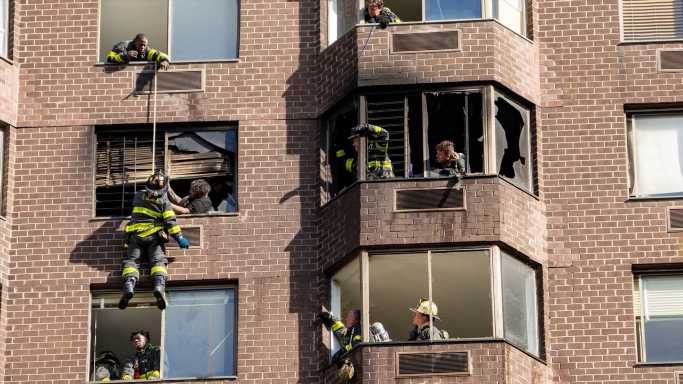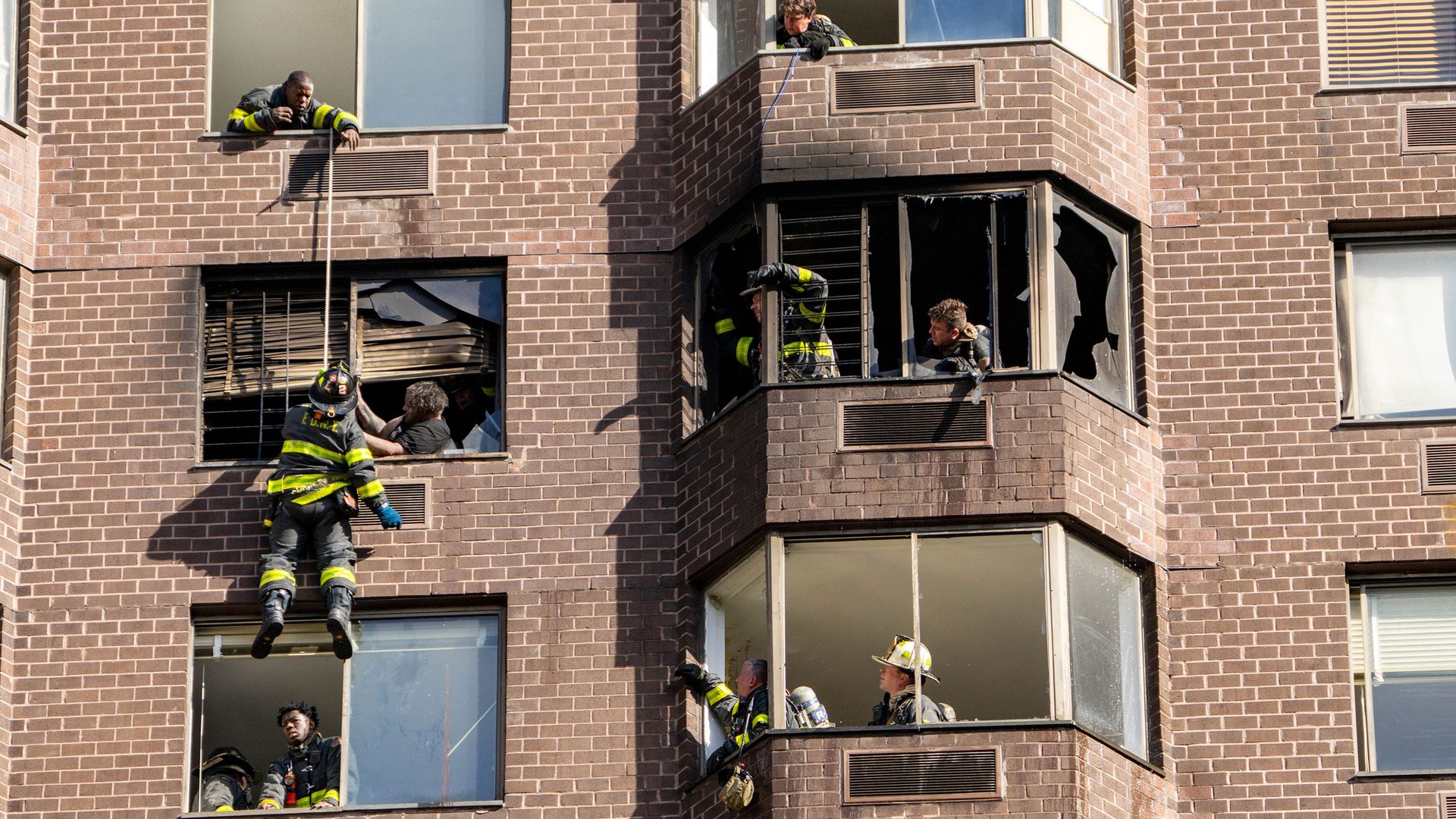
Firefighters perform a rope rescue after a fire broke out inside a high-rise building on East 52nd Street in Manhattan on Nov. 5. Photo: Theodore Parisienne/New York Daily News/Tribune News Service via Getty Images
Some building owners, mainly in New York City, are clamping down on electric bicycles after a recent spate of damaging and deadly battery fires.
Why it matters: E-bikes are surging in popularity, but the benefits they bring — lower emissions, easy transportation — are threatened by the growing toll of injuries and deaths from blazes sparked by their lithium-ion batteries.
- E-bike advocates link the problems to batteries that are poorly made, refurbished or improperly charged.
- New York has seen "an exponential increase" in battery fires this year, Daniel Flynn, chief fire marshal at the New York City Fire Department (FDNY), said at a recent news conference.
Driving the news: A terrifying fire in an apartment building on Manhattan's East 52nd Street this month sent 43 people to the hospital and forced firefighters to rescue a woman dangling from a 20th-floor window. The cause: An e-bike residents left charging by their front door overnight.
- In response, at least one large NYC landlord — Glenwood Management, which runs 26 luxury high-rises — told tenants to permanently remove any e-bikes.
- "Our leases are also being amended to state that residents and/or their guests are prohibited from having an e-bike in their apartment," Glenwood's notice to tenants said. "Additionally, we will not store or maintain them anywhere else on the premises."
- E-bikes and e-scooters are already banned from FDNY buildings. Other cities have their own rules — in London, for instance, they're barred from buses, subways and the Palace of Westminster, where Parliament meets.
By the numbers: New York City has seen 200 lithium-ion battery fires and six related deaths so far in 2022, the FDNY said. (There have been 76 overall fire-related deaths across the five boroughs so far this year, per the New York Post.)
- E-bike fires have caused "more deaths and injuries already this year than in the past three years combined," Flynn said at the news conference, per the Associated Press.
Backstory: The New York Public Housing Authority pledged to ban e-bikes over the summer. However, it reversed itself after an outcry over the city's army of 65,000 app delivery workers, or "deliveristas," many of whom depend on e-bikes to do their jobs.
- Those workers tend to charge their vehicles in their apartments, keeping them safe and dry. But they often buy knockoff e-bikes with lousy batteries because it's what they can afford.
What we're watching: On Monday, the New York City Council will consider several bills to regulate e-bikes, including one that would ban the sale of used batteries.
The big picture: While other cities haven't agonized over e-bike battery fires quite the same way as New York City has, the breakneck growth of micromobility means the issue is bound to spread.
- A new Consumer Product Safety Commission report found e-scooter, e-bike and hoverboard injuries and deaths are rising across the U.S.
- And battery fires "have been garnering attention from fire departments nationwide."
What to know: Keeping an e-bike in your home is "somewhat safe," says Brian O'Connor, a fire protection engineer at the National Fire Protection Association.
- "There's a pretty low probability of these e-bikes catching on fire if you treat them correctly, if you follow the manufacturer's instructions, you use the correct batteries, you store them at the right temperature, you don't lean them up against a heater," O'Connor tells Axios.
Yes, but: "A damaged battery should definitely not go in an apartment building, because when they fail, they fail pretty violently," he added.
More tips: People should only use industry-certified batteries in their e-bikes, said Ash Lovell, electric bike policy and campaign director at PeopleForBikes in Denver.
- Most fires are linked to batteries that don't meet safety standards, Lovell tells Axios. And many consumers don't distinguish between e-bikes and e-scooters and e-mopeds, which can be more likely to have dodgy batteries, she said.
- "I would hate for products that are perfectly safe to be lumped in with products that are problematic."
Source: Read Full Article
